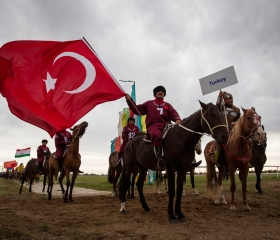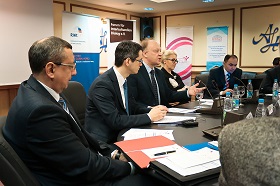In 2014, the complex Russian-Turkish relationship took on a much different tone. Amidst worsening relations between Moscow and a number of Western countries due to developments in Ukraine, Russia and Turkey have managed to maintain close social contacts and a substantial volume of bilateral trade, as well as have strengthened their political dialogue. Over the past year, the heads of both states have held eight phone conversations with one another and have attended significant events that took place in their countries (for example, the XXII Olympic Winter Games in Sochi and the fifth meeting of the High Level Cooperation Council in Ankara). Turkey was also recently invited to join the Eurasian Economic Union. Following the start of negotiations on the Turkish Stream project, which is intended to replace South Stream, bilateral relations have acquired a new strategic character.
The crisis in relations between Russia and the West and a pivot to the East
The development of Russian-Turkish relations in 2014 was largely due to a number of international events, first of all, the situation in Syria and Ukraine, as well as the reaction of the world community to them.
With regards to the conflict in Syria, Russia and Turkey originally belonged to opposing camps. That which included Russia insisted on involving government forces in the political dialogue, and noted the fragmentation of the Syrian opposition and the propagation of radical Islamist ideas. The countries in the other camp, consisting of NATO member states, in particular Turkey, accused Bashar al-Assad of mass killings of civilians and the use of chemical weapons and demanded his complete exclusion from the negotiation process.
In 2014, the crisis in Ukraine was added to the list of unresolved regional conflicts. Different interpretations of the legitimacy of Crimea’s accession to Russia as a constituent entity, on the one hand, and the change of power in Kiev, on the other, as well as accusations towards Russia by a number of Western countries of sending Russian troops to the eastern territories of Ukraine, unleashed a sanctions war and led to a loss of mutual trust. Turkey, despite its NATO membership and association with the EU, adopted a different position on the issue. For Ankara, respect for the human rights of the Crimean Tatars on the peninsula, who constitute one of the largest diasporas in Turkey, was an important component of the resolution of the Ukrainian problem. The Russian side pinned certain hopes on a balanced assessment of the Ukrainian crisis by the OSCE Special Monitoring Mission to Ukraine, headed by former Permanent Representative of Turkey to the UN, Ambassador Ertuğrul Apakan, who was appointed Chief Monitor of the Mission on April 2, 2014.
Analyzing relations between Russia and Turkey with regard to regional challenges reveals various peculiarities to the partnership. For all their differences over the Syrian conflict, Moscow and Ankara fully share a desire to prevent the transformation of Syria into a failed state. Although the views of Russia and Turkey on the situation in Ukraine and the position of the Tatar population in Crimea differ, they share a common priority, namely the creation of a peaceful and secure Crimea. While remaining committed to NATO membership and its plans to join the EU, Turkey has not suspended active contacts with Moscow. Moreover, the difficulties in implementing cooperation projects between Russia and a number of European countries and the United States, have given a significant spark to Russian-Turkish interactions, mainly in the economic sphere.
Key areas of cooperation
Russian-Turkish joint projects in the energy sector are attracting attention, not only in Russia and in Turkey, and have piqued interest far beyond the borders of the two states and the countries of the Black Sea region. During his state visit to Ankara on December 1, 2014, Vladimir Putin announced plans to change the South Stream project to one that would favor Turkey. The construction of a gas pipeline to deliver Russian gas to the EU within the framework of Russia-EU cooperation was cancelled to be replaced by a proposed natural gas pipeline from Russia to Turkey across the Black Sea under the working name Turkish Stream.
The dependence of Brussels on Ankara will grow, especially in view of the expected gas delivery from Azerbaijan via Turkey. Unlike Bulgaria, which was supposed to be the South Stream point of entry into Europe, Turkey is not a member of the EU, has taken a more flexible position on the Ukrainian issue and is already implementing a number of major projects with Moscow in the energy sector.
According to the new project, the pipeline would start at the Russkaya compressor station, built in the Krasnodar region for South Stream, and then run to the south under the Black Sea through the territorial waters of Turkey. Turkey is expected to receive 14 billion cubic meters of natural gas per annum, while the remaining 49 billion cubic meters will be pumped into the landing point for the EU.
At the same time, further development of the first direct Russian-Turkish gas pipeline Blue Stream, which has already had a positive impact on the economic development of the two countries, should not be overlooked. In 2013, this project accounted for more than half of Russian gas supplies to Turkey and for 7% of total gas deliveries abroad (authors’ calculations based on data from the official sites of Gazprom and the Bank of Russia). In turn, the Turkish political elite are very close to reaching the goal of turning the republic into a regional energy operator. However, the final destination points of Russian gas via Turkey as well as the role that EU countries, especially Bulgaria and Greece, will play in this process still remain under wraps.
Another major project in the energy sector implemented in Turkey with the participation of Russia is the construction of the Akkuyu nuclear power plant in the Mersin province on the Mediterranean coast. This project is equally beneficial to both countries. Russia is interested in the construction of nuclear power plants outside its territory to expand its presence in the nuclear industry at a time when major actors in this market are cutting back their activities (for example, after the accident at the Fukushima nuclear power plant, the German government decided to completely abandon nuclear power generation by 2022).
Turkey is interested in developing its own generating capacity. Today, the country generates electricity mainly from natural gas, which has to be imported. The construction of the Akkuyu nuclear power plant with a designed capacity of 4800 MW will enable Ankara to minimize the cost of power generation, as well as reduce its energy costs and balance of payments deficit. The first unit of the NPP is expected to be completed in 2020, and the plant will be fully commissioned in 2023, the year of the 100th anniversary of the Turkish Republic. In addition, the project is being implemented on the BOO (Build-Own-Operate) principles and involves the training of the Turkish skilled personnel.
At the same time, enhancing cooperation in the energy sector continues to increase the imbalance in bilateral trade. In 2013, trade turnover between Russia and Turkey decreased by 4%, down to 32 billion USD, mainly due to fluctuations in the world energy markets. Given record low oil prices in 2014, a significant positive trajectory in trade and an increase in the volume of Russian-Turkish trade turnover up to a declared $100 billion by 2020 appear rather unfeasible.
Humanitarian and intercultural relations occupy an important place in cooperation between the two countries. Turkey remains one of the most popular countries for Russian holiday-makers. According to experts, about 4.5 million Russian tourists visited Turkey in 2014 ((). To maintain this level, the Turkish side plans to subsidize air carriers and to offer favorable credit facilities to organizations operating in the tourism sector. Such initiatives have been prompted by a fear of a sharp decline in tourist flows from Russia due to the change in exchange rates and the resulting increase in the cost of holidays.
By the most conservative estimates, the number of official interracial marriages between Russians and Turks has reached 80 thousand. The opening of the Russian Centre of Science and Culture in Ankara in February 2014 gave new momentum to extensive humanitarian contacts between the two countries. The Center is designed not only to help maintain interest in Russia, but also to become an independent platform for developing contacts among citizens of the two countries.
Relations between Russia and Turkey offer an interesting example of enhancing cooperation in the economic, humanitarian and security spheres irrespective of each other. This parallel development of different spheres of cooperation allows them to achieve progress in each of them separately, and then take advantage of the cumulative effect of the ongoing projects together.
Prospects for relations
Judging by the experiences of the past year, we can expect that in 2015 relations between Russia and Turkey will develop in several directions.
Energy, tourism and construction will be the key areas of bilateral cooperation. The proposed Turkish Stream gas pipeline project, despite its high potential for implementation, requires a lot of work in technological, economic and political terms. Much will depend on the ability of Turkey to organize the sale of gas to end users. Special attention should be paid to media and expert support for the project, including measures to shape public opinion in both countries in its favor.
As for the construction sector, our fruitful cooperation so far has been quite specific to the actual development of our bilateral economic agenda since the 1990s. Given that in 2018 Russia will host the FIFA World Cup, Turkey with good reason expects its construction companies to be awarded contracts to build sports facilities. Crimean development projects also open up new possibilities for Turkish construction companies.
Tourism has been a traditional item on the agenda of bilateral relations. Given the changes in the ruble exchange rate and the current state of Russia-EU relations, the Turkish side will seek to maintain, and, if possible, increase the flow of tourists from Russia. In July 2014 plans were announced to possibly settle the payment of travel packages in rubles. To simplify the visa regime, the Turkish Foreign Ministry is discussing the prospect of opening entrance to the Russian citizens on national passports.
The opportunities available to Russian-Turkish inter-university cooperation are of particular interest. Today, Turkey enjoys a significant growth of university education, and the share of private universities that provide it is constantly increasing. The Russian-Turkish public forum held on November 13, 2014 in Antalya showed that the role of universities can take on additional dimensions in the current international situation. Contacts among scientists, lecturers and students allow for an escape from the logic of crisis-based thinking and the identification of new forms of constructive and mutually beneficial dialogue.
The settlement of the Syrian crisis will remain the major sphere of the two countries’ joint efforts at the regional level. The common border with Syria makes this problem a priority for Turkey. The main issues to be discussed with Russia are the development of efforts concerning migration and the countering of threats to statehood in the region posed by the Islamic State. Moscow and Ankara favor the elaboration of a swift and sustainable solution to the problem of refugees on the Syrian-Turkish border. In the course of settling the Syrian crisis and eliminating the negative effects of the Arab Spring in the Middle East, Russian-Turkish cooperation can be directed at developing coordinated steps to combat the spread of radical Islamic ideas.
In light of the withdrawal of the international coalition forces from Afghanistan, the issues of security and stability in Central Asia are assuming great importance. The Shanghai Cooperation Organization (SCO) could become a promising platform for cooperation in this area, particularly due to the fact that Russia holds the SCO Presidency in 2014-2015. Cooperation between relevant security agencies of the two countries could be expanded in order to combat crime, drug trafficking, arms trafficking, and human trafficking.
Russia and Turkey are founding members of the Organization of the Black Sea Economic Cooperation (BSEC): they are the largest coastal countries and the nature of their relationship determines in many respects the situation in the Caspian-Black Sea region. However, Black Sea cooperation between the two countries within the BSEC framework is unlikely to come to the fore. Nevertheless, this format should not be ignored, as BSEC could become a convenient platform for coordinating complex economic projects in the region, testing initiatives and building additional support.
Despite the tense relations between Russia and certain European countries amidst the Ukrainian crisis, and the lack of encouraging progress in Turkey’s accession to the EU, Moscow and Ankara are still interested in the project of building a Greater Europe. A common security space “from Lisbon to Vladivostok” is impossible without the active cooperation of all the three “poles,” namely Russia, Turkey and the European Union. By contrast, increased rivalry between these poles (as seen with the South Stream and the Turkish Stream projects) leads to the weakening of the system and the accumulation of power imbalances.
At the global level, there are various opportunities for cooperation within the G20 framework. Turkey has formulated its G20 Presidency in 2015 through the three I’s: Inclusiveness, Implementation, and Investment for growth. This approach puts a special emphasis on the projects of developing medium and small-sized businesses in G20 countries. It can become an important incentive for promoting economic contacts between Russia and Turkey, and for making progress towards the set goal of tripling mutual trade turnover.
Elections to the Turkish parliament in June 2015 could make certain adjustments to progress in bilateral relations. This notwithstanding, the basic parameters and the strategic objectives of cooperation between Russia and Turkey will be maintained. They are focused on maintaining regional and global stability, on enhancing Russian-Turkish trade and economic cooperation, and on strengthening humanitarian contacts. The 95th anniversary of the establishment of diplomatic relations between Russia and the Republic of Turkey could become an additional incentive to developing bilateral cooperation in 2015.
The article was published in the 2015 Yearbook of the French-Russian Analytical Center l'Observatoire. The Yearbook presents expert opinions on a wide range of domestic and foreign policy, economic and cultural issues of Russia’s development. Russian edition was presented on the sidelines of Saint Petersburg International Economic Forum.









